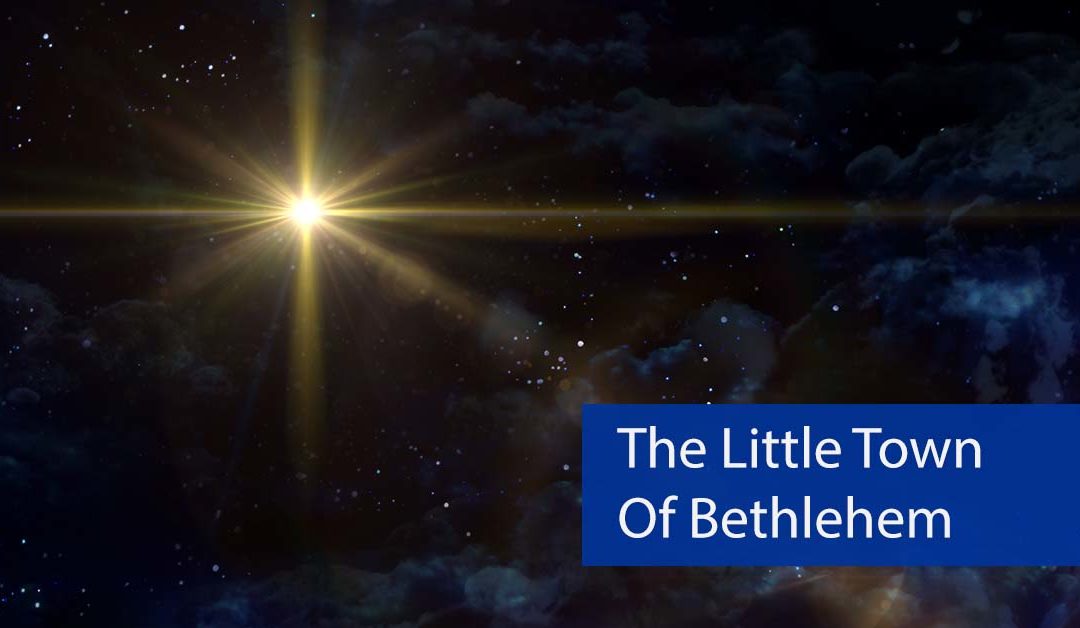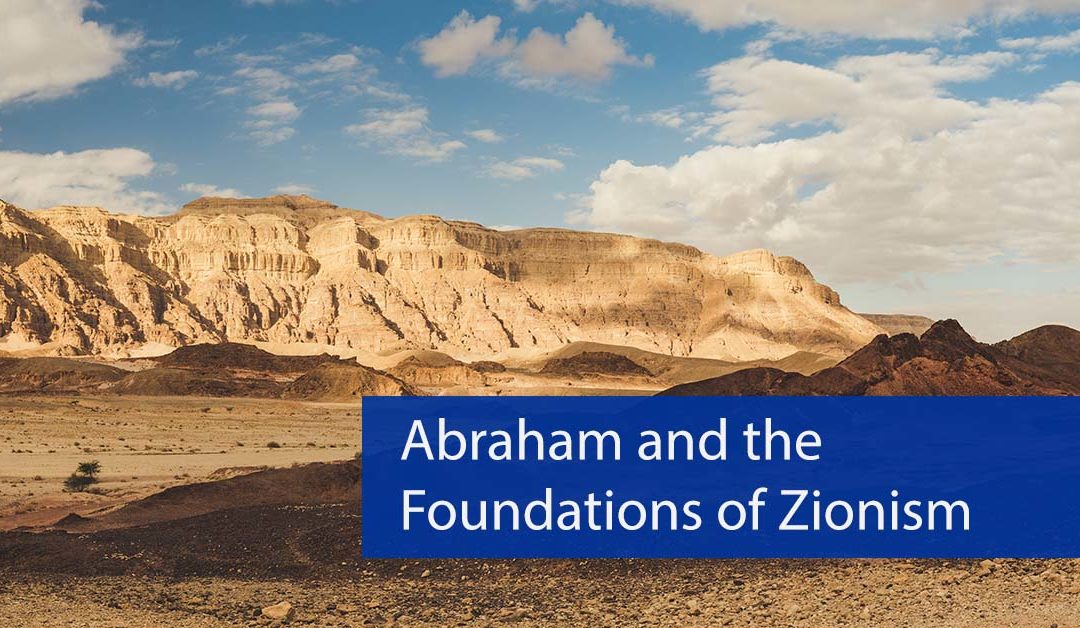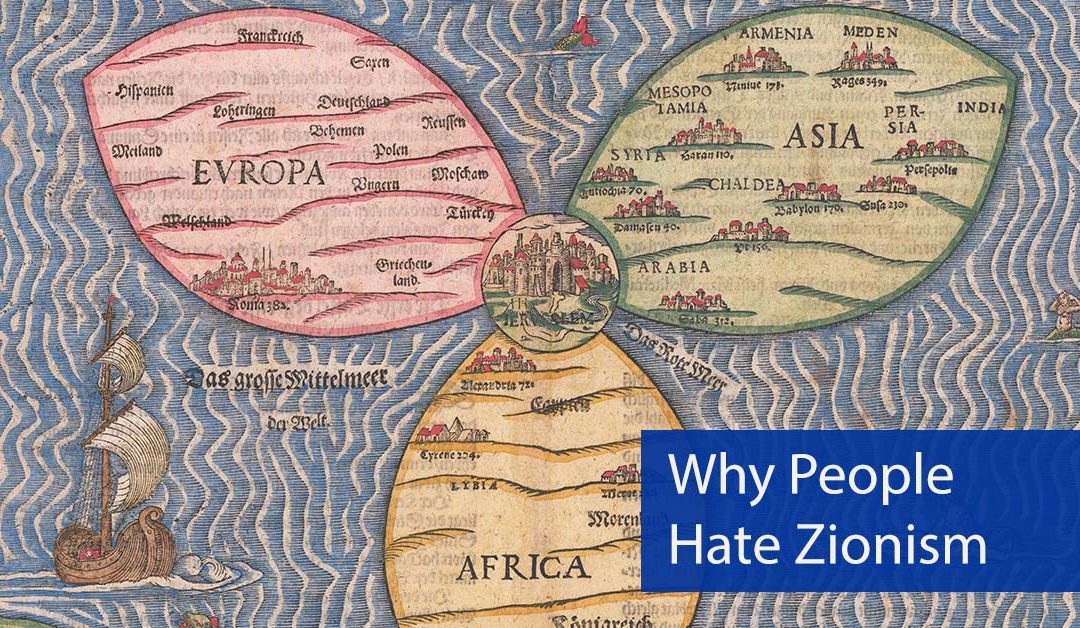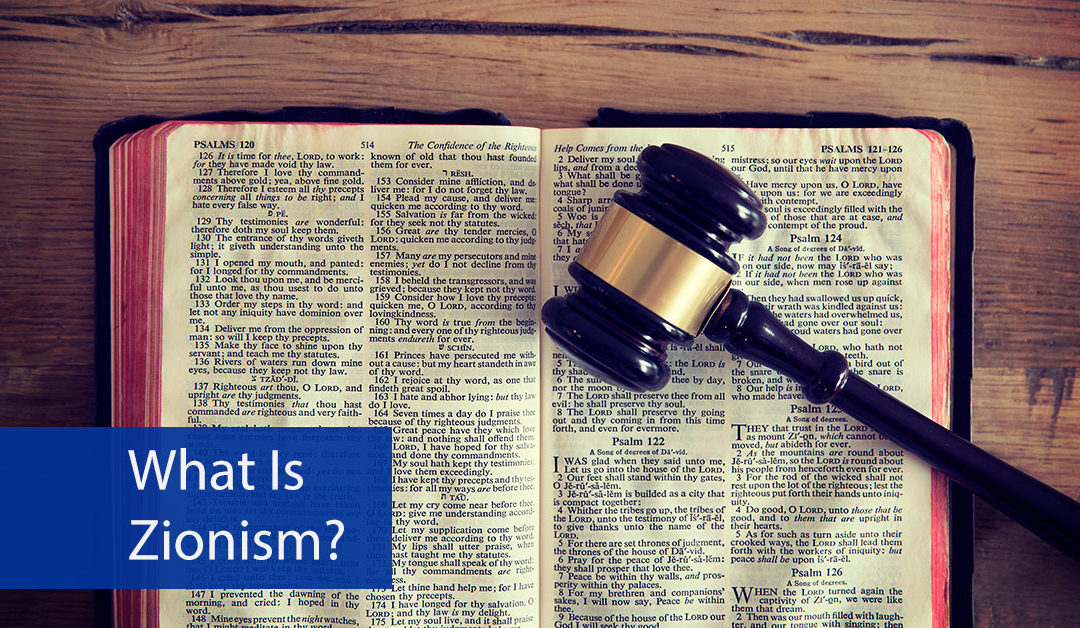
by Dr. Mike Evans | Feb 9, 2022 | Articles
While much has been said in modern times about the Jews fleeing to Palestine for safety from persecution, pogroms, and the Holocaust, Abram was certainly not a refugee running for his life when sent forth in search of God’s Promised Land. He had no need. He was wealthy and well respected in Ur. He went in faith only because God told him to go. It is important to note that the land given to Abraham and his descendants was a relatively small area when compared to that occupied by Arab tribes.
It is also notable that neither loss of their homes nor exile because of rebellion and disobedience had any effect on God’s promise of ownership of the land. The Bible does not indicate that the Jewish people had any desire to increase the area God had defined for them to occupy. The opposite is true: The annals of Zionism detail how the Jews have been willing to give up land again and again in an attempt to live at peace with their neighbors.
God renewed His covenant with Isaac and again with Jacob. The Torah—the first five books of the Old Testament and Moses’ record of the travels of Abraham’s descendants—shows their steady march toward the Promised Land. When Moses led the Exodus of the children of Israel out of bondage in Egypt, the group had grown from less than one hundred to more than 600,000 men, plus an untallied number of women and children.
Standing atop Mount Nebo in western Jordan, Moses reiterated the boundaries God had set for the Promised Land. The Torah is impregnated in the genes of the Jewish people—those who practice their religion and those who do not. The longing to return to Zion, the land from which they were exiled and to which they understood they belonged, is as innate as the need for food and water. It is their biblical, cultural, and political heritage.
When the nation of Israel was reborn on May 14, 1948, it was evidence of God’s fidelity to His Word and a clear statement that there is, indeed, hope and redemption available for this world. He said so in His Word and cannot lie: “God is not a man, so he does not lie. He is not human, so he does not change his mind. Has he ever spoken and failed to act? Has he ever promised and not carried it through?”
Down through the centuries, the Jewish people have cried and prayed for freedom. From the building of Solomon’s Temple to its destruction in 586 BC to the completion of the Second Temple in 516 BC, from exile in Babylon to the return of the Jews to Jerusalem under Cyrus the Great, Jews have yearned for their homeland and for Zion. Can this have been the very first, visible expression of Zionism—the return of the Jewish people to the land of the patriarchs?
It was toward Zion that the Jews prayed daily. It was of Jerusalem that the psalmist wrote: “If I forget you, O Jerusalem, Let my right hand forget its skill! If I do not remember you, Let my tongue cling to the roof of my mouth—If I do not exalt Jerusalem above my chief joy.” I am a Zionist, a Christian Zionist. Everyone who takes the Bible seriously must be. We must stand with and for Israel.

by Dr. Mike Evans | Dec 30, 2021 | Articles
For most of us, the name Bethlehem immediately summons images of a manger and shepherds and a star shining brightly in the night sky, guiding visitors from far away eastern lands. Many hear the words Phillips Brooks, rector of the Holy Trinity Church in Philadelphia penned in 1868 following his return from a visit to the Holy Land.
O little town of Bethlehem
How still we see thee lie
Above thy deep and dreamless streets
The silent stars go by
Yet in thy dark streets shineth
The Everlasting Light
The hopes and fears of all the years
Are met in thee tonight.
Few places in all of Israel better illustrate the lengths to which the enemies of the Jewish people will go to deny the truth of their heritage in the land for thousands of years than the fate of Bethlehem. This obscure village in Old Testament days became famous because it was the home of King David. And in fulfillment of prophecy, Bethlehem is where Jesus was born about 1,000 years later.
The name Bethlehem means “house of bread” in Hebrew, and it is located not far from Jerusalem. It is fitting that the Bread of Life would be born there to a young virgin named Mary who had made the lengthy and difficult trip from Nazareth with her espoused husband Joseph because they were both descendants of David. The Church of the Nativity in Bethlehem marks the spot where, according to tradition, Jesus was born.
But today most visitors to Israel who go desiring to see the places where the important events of Scripture happened do not visit Bethlehem. The city is in territory controlled by the Palestinians, and the danger of attack is so high that many tours of the Bible lands no longer include a visit to the birthplace of Jesus. Many of the Christians who once lived there and in other areas of controlled by the Palestinian Authority have been forced to move because of the threat of violence.
In fact, the number of Christians of various denominations living in Palestinian areas is estimated to have declined approximately 90% in the last century, with most of the change happening in the recent past. Today the letter “N” painted on the outside of a house (symbolizing the residents are followers of Jesus of Nazareth) is often the precursor to vandalism or even a violent attack.
Yet because Bethlehem is currently under Palestinian control, the claim is often made that Jesus Himself therefore is a Palestinian rather than a Jew. This outrageous falsehood is declared publicly without shame (and too often without rebuttal from those who know better) by Palestinian leaders. At the Christ at the Checkpoint Conference—a gathering of liberal religious groups that harshly criticize and oppose Israel—earlier this year, Palestinian Authority Foreign Minister Riyad al-Maliki said that Jesus would not have been allowed to attend “simply because he was a Palestinian.”
Those who deny historical Jewish links to this land God promised to Abraham thousands of years ago are either ignorant or deliberately deceitful. This land is essential for Israel’s security and self-defense. It is not part of a historic Palestinian state, for there has never been one. Israel did not conquer Palestine—they defeated the forces of Jordan during the Six-Day War in 1967 after Jordan had illegally seized the land during the War of Independence launched by Israel’s Arab neighbors in 1948.
We launched our Save the Bible Lands campaign to declare our support for the recognition of Israel’s right to the Bible lands of Judea and Samaria. The Jewish people who live there are not occupiers of enemy territory. They live in Israel. Land for peace has been proven to be folly because so many of the Palestinians do not want peace. They want Israel destroyed. Every friend of freedom and every friend of the Jewish people should stand with Israel when it comes to control of the Bible lands.

by Dr. Mike Evans | Nov 17, 2021 | Articles
In actuality, Abram (Abraham) of the Old Testament might be designated as the first Zionist. He was a wealthy man in the village of Haran. Christian Zionist Walter Clay Lowdermilk wrote: “The movement for a Jewish homeland in Palestine [began four thousand years earlier] when Abraham, prompted by Divine inspiration, left the plains of Mesopotamia to establish a new people on the land of Canaan.”
Abram was the son of Terah, a seller of idols, but from early childhood questioned his father’s dedication to gods fashioned of stone and wood. Abram began to seek the truth and came to believe that his surroundings, the earth and sky, were the work of one Creator. He began to share this concept with others. I envision Abram sitting on a bench outside the front flap of his tent. Sarai, his wife, is likely overseeing the servants as they go about their daily tasks—winnowing grain, hauling water for the animals, spinning cloth, or roasting a goat or camel.
Perhaps God had appointed others who failed to answer His call, but obviously, the Creator sees a trait in Abram that prompted Him to say, “That’s My man! He’s the one with whom I’ll make a covenant.” So suddenly, Abram found himself in an encounter with Jehovah God. He was stunned to hear the voice of the Lord calling to him: “Get out of your country, from your family and from your father’s house, to a land that I will show you.”
Abram responded with great faith. Imagine the conversation he must have had later that day with Sarai: “Wife, we’re leaving first thing in the morning. God told me to go. Have the servants take down the tents, gather the flocks, pack everything, and load the camels.” “Abram, what do you mean we’re leaving? We can’t leave. Where are we going?” “I don’t know yet,” Abram responded. “God will tell me when we get there!”
Along with Lot, Abram’s nephew, they packed up “all their possessions that they had gathered, and the people whom they had acquired in Haran, and they departed to go to the land of Canaan” (Genesis 12:5). Abram’s complete trust in God and his obedience are unique in Scripture, although he did bring Lot and his father even after God had instructed him not to bring any relatives (Genesis 12:1). His father died on the journey, but by the time Abram had reached the Land, he and Lot had acquired so much cattle and livestock that they had to separate (Genesis 13).
Following Lot’s departure and the later destruction of Sodom and Gomorrah, God again spoke to Abram: “Lift your eyes now and look from the place where you are—northward, southward, eastward, and westward; for all the land which you see I give to you and your descendants forever. And I will make your descendants as the dust of the earth; so that if a man could number the dust of the earth, then your descendants also could be numbered. Arise, walk in the land through its length and its width, for I give it to you” (Genesis 13:14-17).
After this land grant was bestowed upon him, Abram’s name was changed to Abraham, for God had declared that his servant would be “a father of many nations.” At the same time, He changed Sarai’s name to Sarah (princess) and announced that she and Abraham would have a son, Isaac. The news must have come as a great shock for both, as they were already well past their childbearing years. But Isaac was born just as God promised. The covenant between God and Abraham would pass to Isaac, and through him to Jacob and to future descendants.

by Dr. Mike Evans | Oct 6, 2021 | Articles
Zionism is something that has become very controversial in our day. In fact, speaking out against Zionism has become the new and acceptable form of anti-Semitism. In 2001, the United Nations Conference World Conference Against Racism met in Durban, South Africa. At the urging of Jew-haters, they declared that Zionism—the idea that Jewish people deserve a home in the land of their fathers—was itself a form of racism.
That’s right. If you believe God’s Word, the United Nations, which means most of the nations, thinks you are a racist! It’s outrageous.
Christian Zionism is defined as the support of the return of the Jewish people to Zion (Jerusalem or Israel) by Christians. These Christians recognize and celebrate the biblical covenant in which God promised certain lands to Abraham and his descendants—forever. This divine land grant, called the Promised Land, would be theirs for all time.
Since God’s decree, there has always been a presence of Jewish people in the Land, but they did not always rule it or maintain it as the State of Israel. That began to change in the 19th century. The contemporary outpouring of support for the belief in a homeland for the Jewish people surged to the forefront of British foreign policy in the 1800s. It was spread from there to the United States by those who believed in a literal interpretation of the Holy Scriptures: William Blackstone, Cyrus Scofield, Dwight L. Moody, John Nelson Darby, Professor George Bush, and other noted Bible scholars.
First, the Blackstone Memorial and then the Balfour Declaration began to influence noted politicians who were forced to take a stand—for or against God’s Chosen People. After a decades-long battle for the right to possess their original God-given grant, David Ben-Gurion stood before a microphone on May 14, 1948, and declared the rebirth of the State of Israel in Palestine. United States President Harry Truman was the first foreign head of state to acknowledge the new nation, and other heads of state took up the gauntlet to ensure that Israel would survive.
The Jewish people were no longer what staunch Zionist Chaim Weizmann had called “a sort of disembodied ghost.” They were following the command given to them in Deuteronomy: “Every commandment which I command you today you must be careful to observe, that you may live and multiply, and go in and possess the land of which the lord swore to your fathers.” When asked to speak to the Palestine Royal Commission in 1936, Weizmann explained: “I believe the main cause which has produced the particular state of Jewry in the world is its attachment to Palestine. We are a stiff-necked people and a people of long memory…. Whether it is our misfortune or whether it is our good fortune, we have never forgotten Palestine, and this steadfastness, which has preserved the Jew throughout the ages and throughout a career that is almost one long chain of inhuman suffering, is primarily due to some physiological or psychological attachment to Palestine. We have never forgotten it nor given it up.” Hebrew writings refer to Israel as the “navel” of the world, with Jerusalem at its center.

by Dr. Mike Evans | Aug 25, 2021 | Articles
If you understand what is taking place in our world today, you know what motivates the enemies of Israel, what unites anti-Semites across the globe, and even confuses the loyalties of some evangelical leaders—it is the single word Zionism.
ZIONISM is a belief in God’s promise of the land (Eretz Israel) to His Chosen People.
Numbers 34:1-2: “And the LORD spake unto Moses … this is the land that shall fall unto you for an inheritance, even the land of Canaan with the coasts thereof…”
Standard history records Theodor Herzl as the founder of Zionism, but that is not correct. Zionism was declared and decreed by God Almighty, El Shaddai, the God of Abraham.
Thus said the Lord God: …you, O mountains of Israel, shall yield your produce and bear your fruit for My people Israel, for their return is near. For I will care for you: I will turn to you, and you shall be tilled and sown. I will settle a large population on you, the whole House of Israel; the towns shall be resettled, and the ruined sites rebuilt. I will multiply men and beasts upon you, and they shall increase and be fertile, and I will resettle you as you were formerly, and will make you more prosperous than you were at first. And you shall know that I am the Lord. I will lead… My people Israel to you, and they shall possess you. You shall be their heritage, and you shall not again cause them to be bereaved. (Ezekiel 36:7-12).
Mount Zion is where Abraham offered up Isaac as God directed. The word Zion occurs over 150 times in the Bible. It essentially means “fortification” and has the idea of something that is “raised up” as a “monument.” Zion is described both as the city of David and the city of God. As the Bible progresses, the word Zion expands in scope and takes on an additional, spiritual meaning.
The word Zion is also used in a theological or spiritual sense in Scripture. In the Old Testament, Zion refers figuratively to Israel as the people of God (Isaiah 60:14). In the New Testament, Zion refers to God’s spiritual kingdom. We have not come to Mount Sinai, says the apostle, but “to Mount Zion and to the city of the living God, the heavenly Jerusalem” (Hebrews 12:22). Peter, quoting Isaiah 28:16, refers to Christ as the Cornerstone of Zion: “See, I lay a stone in Zion, a chosen and precious cornerstone, and the one who trusts in him will never be put to shame” (1 Peter 2:6).
Zionism is God’s prophetic plan for the future of our world.

by Dr. Mike Evans | Jul 14, 2021 | Articles
Why does an all-powerful God permit pain and injustice in our lives? Mankind has struggled with this tough question since time began. For those who have been victimized and traumatized, the question becomes far more than just a stimulating topic for discussion. Driven by a desperate search to find truth and meaning, we eventually resolve the question one way or another. For some of us, the search leads to trust and faith. Others, too angry or anguished in spirit to continue the search, walk away empty.
The Old Testament Book of Genesis contains a story that rivals any current bestseller or famous classic for its suspense and attention-gripping plot. It is the incredible story of Joseph, a young man who victoriously overcame one injustice after another, any one of which would be enough to embitter or break the average person. It is also the story of Joseph’s incredible God and how He turned Joseph’s pain into preparation for promotion.
For years Joseph was the target of his brothers’ vicious jealousy, hatred, and rejection. Their father, Jacob, had never disguised the fact that Joseph was the favorite of his twelve sons. Because of their father’s partiality, his ten older brothers hated Joseph so much that they couldn’t speak a kind word to him.
When Joseph was seventeen, his brothers’ malevolent feelings reached the boiling point. Genesis 37 records the ugly scene. Instead of killing Joseph as they had originally planned, they threw him into a well in the wilderness and then sold him to a band of traders whose caravan passed by. In Egypt, the traders sold Joseph to Potiphar, a high-ranking officer and chief executioner of the royal guard for Pharaoh, king of Egypt. Jacob’s favored son was now a slave.
Things went from bad to worse, and Joseph ended up in prison on false charges. Then one day everything changed. He went from the prison to the palace. Thirteen years of some of the longest, darkest trials imaginable had neither embittered nor broken Joseph. His life serves as a strong reminder that it is not suffering itself, but our reaction to the suffering, that makes or breaks us.
In the final analysis, it was a powerful, sovereign God, not Joseph’s brothers, who sent Joseph to Egypt. But the Bible puts the responsibility for all the agony Joseph endured exactly where it belongs—not upon God, but upon the people whose offenses against Joseph caused his unjust pain and suffering. The Bible also clearly reveals that God took the wicked injustices intended for Joseph’s destruction and reversed them, making the offenses work together for Joseph’s development and deliverance instead.
In the middle of your darkest trial, keep seeking development as did Joseph. He learned to forgive. He learned to resist sin and serve God in a pagan society. He learned to defeat bitterness, loneliness, and hopelessness and to persevere in faith and prayer. Like Joseph, you will discover that as you seek development, deliverance will come in God’s appointed time, and the pain you have endured will become a necessary step on your pathway to promotion.












